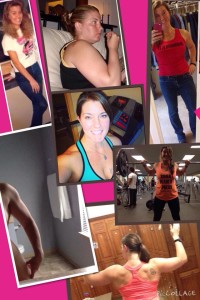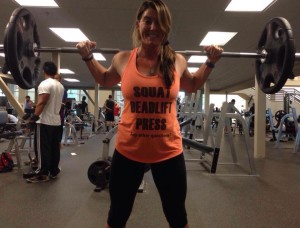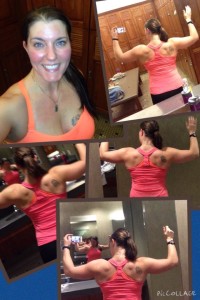Jenny Goodwin has been a close friend of mine for several years. In this blog post she opens up to me about her personal struggle with disordered eating (ED), which lasted many years. She has slowly lost over 70 lbs and has maintained it, and describes how she succeeded in this interview below.
Disordered eating ranges from behavior like anorexia nervosa, bulimia, binge eating, but there are various shades of each condition (including skipping meals, orthorexia, excessive exercising, etc), all of which will likely require the help of a medical professional or counselor.
**Warning** Some of her personal stories shared here may be triggering for some. None of the information or advice shared here is meant to take the place of guidance from a doctor, mental health provider, or dietitians with experience in eating disorders.
Sumi: Looking back, how do you think this all started? How old were you?
Jenny: I can’t say for certain how it originally started, but I recall knowing I didn’t like my body at approx. age 9/10.
Sumi: Was it just one incidence that changed your view of yourself, your body image? Or was it cumulative?
Jenny: It was cumulative, for sure. It seemed like my mother was always dieting; she had one of those little pocket calorie-counting books to track her calories; she would also cut out foods, skip meals, then would wake up in the middle of the night and binge on peanut butter and mayonnaise sandwiches. She drank Tab, had diet books/magazines lying around the house and she also exercised a lot (Richard Simmons album with pullout exercise booklet…which I often did with her) My mother was a typical yo-yo dieter.
When my mother was drinking (which was a daily occurrence), she would remind us how much she hated her body. She would tell us it was our fault she was fat, had a giant scar (from her c-section) and stretch marks. I laugh at this now, but
when you’re young and being told it’s your fault someone hates their body, it can really mess with your head.
I had always been skinny and don’t recall having an issue with it, but
I do remember thinking my mother looked just fine and I didn’t understand why she was always so obsessed with her appearance and losing weight.
At some point I started having negative thoughts about not only my body, but my crooked teeth, the tracheotomy scar on my neck and some stretch marks I had developed on my hips and breasts.
When I was only 9 or so, my body was well developed already (if I recall correctly, my breasts were already a B cup). You can just imagine how boys are at that age—I was made to feel completely objectified. I hated that my body brought so much unwanted attention.
So, the final straw for me at age 16 was as simple as a statement by my boyfriend at the time. I was lying prone on his bed and I don’t recall what prompted the statement, but he said,
“I’ve never dated a fat girl and I won’t start now.”
I was certainly not heavier than his prior girlfriends, and while I didn’t feel like I was fat, I also didn’t love my body. This comment stuck and I instantly felt this fear of weight gain and this desperate need to be and stay thin, only I didn’t know how to go about it—other than what I grew up seeing my mother do.
On top of this, my boyfriend would do other things that would make me feel self-conscious, such as, pointing out pimples on my face. He made me feel completely repulsive at times. He also had a serious anger problem and was physically abusive at times. I think over the years everything compounded; I was young, had no constant father figure in my life, had an alcoholic mother that hated me and a boyfriend that made me feel fat and flawed.
Sumi: What was your first sign to yourself, that something wasn’t right?
Jenny: When you are so hungry and yet so afraid of people seeing you eat—for fear they’ll judge you— that you feel it necessary to sneak food and inhale it while hidden in a bathroom or closet…it’s a pretty strong indication something is not right.
Sumi: I understand you went through several phases; first anorexia, then bulimia. Or was it a mix of both?
Jenny: It was a mix over the years. I started by skipping meals and going long periods having only eaten a very small amount. That can really only be sustained short-term because people start noticing and the last thing I wanted was for someone to nag me about how I needed to eat more.
It’s extremely annoying to hear people say, “eat a cheeseburger.”
Also, you get really hungry eventually you binge because, well, you’re hungry. So that’s when the purging started because I realized I could eat and appease those people saying I needed to eat and the food didn’t really ‘count’ since it wouldn’t be staying down there for long. To me, that was balance—don’t eat around certain people, then eat and purge when you’re around others.
I also exercised quite a bit; I grew up roller skating and I bought VHS tapes and did them at home. Cher’s first step aerobics VHS was my jam and I did it so much that I had it memorized (I could probably do it today with my eyes closed).
Sumi: When did you realize that you needed help? Who helped you? What steps did you take?
Jenny: This all continued on and off for around 9 years. I did go months at a time without purging, but disordered eating (skipping meals, hiding food, starving, and bingeing) was still very much a part of me for 9 years.
Then I met the man that would later become my husband and he was accepting and loving and even though I thought I had hid my ED well (I had hid it from everyone else),
he knew and he told me it wasn’t necessary and I believed him. I felt safe being me.
I’m oversimplifying it, but really at that time, I thought that because he loved me, I could just be me and I’d be fine. I didn’t fear eating in front of him, so I ate. Unfortunately, I didn’t know how to eat properly; we were poor growing up, so all I knew was soda, fast food, spaghetti noodles with butter, comfort foods, etc.
So what do you think happened? I got fat, that’s what happened.
I basically swapped one extreme for the other.
It didn’t happen overnight, but little by little over the years I piled on the fat. I was overfat and feeling helpless—that was me. I could say that because I had stopped purging and I was now fat—which is what most consider to be the opposite of someone with an ED—that I was recovered from my ED, but I would be lying, right? Because overeating to the point of becoming overfat is still a form of disordered eating, isn’t it? Anyway, I didn’t want to go back to what I had done before, because I didn’t want to end up in the same place I started…
Meanwhile my husband was applying for a new career and we had started doing a lot of research about it and I ended up on some forums intended for those applying for this particular field. The application process required that you pass a physical agility test and there was this one guy on the forums that was super helpful to everyone and kept answering people’s questions on how to prepare for such a test.
That man was Will Brink. He was so knowledgeable on fat loss and fitness, so I started researching Will and found his Fat Loss Revealed e-book and forums. I bought his book in 2009 and I would say that’s when my real life-changing journey started.
I dove into the e-book and forums and started reading as much as possible, trying to learn how to lose fat and be healthy. At first it was like reading a foreign language, but I was determined and the moderators on the forum were so knowledgeable, helpful and patient…boy, were they patient. I asked anything and everything and if I didn’t understand, I would ask for clarification.
They are strong advocates for weight lifting, so I had started trying to incorporate that into my life, even though I was severely limited as far as the equipment I had to use.
It was through those forums that I also learned about experts, such as Lyle McDonald. I started reading his books and articles and was really enjoying learning about nutrition and the physiology of fat loss.
Even though I learned a lot in a short time, nothing really seemed to stick. Calories in vs calories out and balanced eating/eating in moderation seems like such a simple concept, but not so much when you try and implement the changes into your own life. I thought changing from Hot Pockets to Lean Pockets was a step in the right direction. Clearly I had no clue what I was doing and had a lot to learn.
I recall taking a break from the forums, but don’t remember exactly why. I continued to make some changes here and there, including quitting smoking. Unfortunately, while that was a huge accomplishment, I was replacing cigarettes with food and ended up gaining even more weight (I was approx. 212lbs). This had me even more determined to lose fat and I dove in once again and started learning more and in Nov 2011 I joined a gym.
I didn’t have anyone to consistently go with and I felt incredibly out of place and intimidated, so I just did aerobics classes until I decided it wasn’t for me. I think it was March 2012 I finally decided I wasn’t going to let my being intimidated stand in my way.
I joined the big boys in the free weight area at the gym, started incorporating small dietary changes and never looked back.
Sumi: Sadly, anorexia and bulimia aren’t the only types of disordered eating. What other forms of eating disorders are you noticing in the fitness realm?
Jenny: It seems you can’t look around without seeing some form of disordered eating. You’ve got people unnecessarily restricting or cutting out foods or food groups. Some people are incredibly fixated on ‘clean eating’. There are also extremes in the other direction where people condemn those that do enjoy eating nutrient dense foods, because they have had success eating toaster pastries and feel everyone should enjoy some fucking pastries.
Sumi: Tell me about how strength training and your own education as a bodybuilder has helped you overcome disordered eating.
Jenny: Losing fat is frustrating and when you have a lot to lose, it can seem hopeless. I knew that what I had done previously wasn’t effective and certainly not healthy and people around me had always tried fad diets and gimmicks, which did not prove effective.
So, I threw myself into weightlifting and instead of setting a goal based on weight, or jean size, I focused more on my progress in the gym. This, combined with small changes in nutrition over time (learning to use food to fuel my activity), led to major changes in my body. Consistency is important and with that consistency will come changes in your body and when you see those changes, it’s so incredibly motivating.
Sumi: What are some of the best resources (online, or books, etc) that can help other people overcome their struggles with disordered eating?
Jenny: First and foremost, if someone has a severe ED, they should seek advice from a medical professional.
If you are looking for more casual support, I would encourage you to check out a FB group called “Eating the Food”. I also feel that following “Go Kaleo – Amber Rogers” would be beneficial.
Unfortunately we’re surrounded by inaccurate information…it’s everywhere. So, if you’re more like me and really just need to learn balance and to know where to find accurate information about fat loss/maintenance/gaining muscle/proper nutrition, etc., I would highly recommend anything written by:
Will Brink – Brinkzone.com, fatlossrevealed.com, bodybuildingrevealed.com
Lyle McDonald – Bodyrecomposition.com
Alan Aragon – Alanaragon.com (He also has a new book “Lean Muscle Diet”)
I’ll leave it at that since I don’t want to overwhelm people. For people that love learning, the information on those sites will keep you busy for quite some time.
Sumi: Anything else you’d like to offer our audience?
Jenny: I have lost 70+lbs of fat over the last couple years and have maintained it. I am no longer a slave to the number on the scale because I educated myself as to what that number indicates.
I have some cellulite and stretch marks from my journey and I accept that. These days, unless someone asks about it, I often forget I have a scar from my tracheotomy. My teeth aren’t straight—it’s one more thing that makes me unique. I just wore a hole through my jeans from my upper thighs rubbing together. This made me laugh because years ago this would have made me depressed,
but I know how strong my legs are…my jeans just couldn’t contain the awesomeness.
So many people to go into a fat loss phase with the attitude of ‘let’s do this and get it over with’, but it’s not a one-time thing and you’re done—the changes you make and the things you learn along the way should last you a lifetime and help you maintain your health and fitness level.
Keep in mind that in terms of diet, what works for some, won’t work for you. Some people love to eat ‘clean’, do intermittent fasting, low carb, no carb, low fat, etc. If this works for them, great, but it is certainly not one size fits all. Some people are such strong advocates for their diet that it’s to the point of being cultish and they will condemn all others. Personally, I don’t enjoy restricting the foods I eat. What I do enjoy is eating micro/macro nutrient dense foods, while incorporating some less nutrient dense/calorically dense foods in moderation. Find what works for you.
I believe in baby steps. I didn’t get to where I am overnight. It’s about slowly making changes over time. Sustainability.
What good is it to lose a bunch of weight if you did in such a way that proves to be unsustainable? All this will do is add to the frustration you were likely already experiencing.
I’m not a parent, so many would likely argue that I have no place in telling someone how to parent. I will say this though: be careful what messages you’re sending to your children.
Perfection is unreachable—it’s a façade for fake people in magazines and media. You are given one life, so don’t waste it trying to be someone you’re not while trying to please people whose opinions don’t fucking matter anyway. You will never be what people want you to be.
Just be you…for you.



 Colin Craggs
Colin Craggs
February 15, 2015 at 11:42 amAs a member of the fatlossrevealed forum its wonderful to hear your story. You have been a wonderful encouragement to myself and others. Thank you for being you Jenny. As a parent I want to say that your parental advice in this article is spot on.